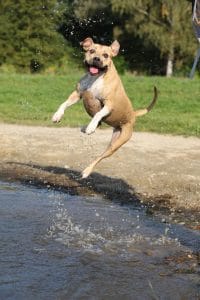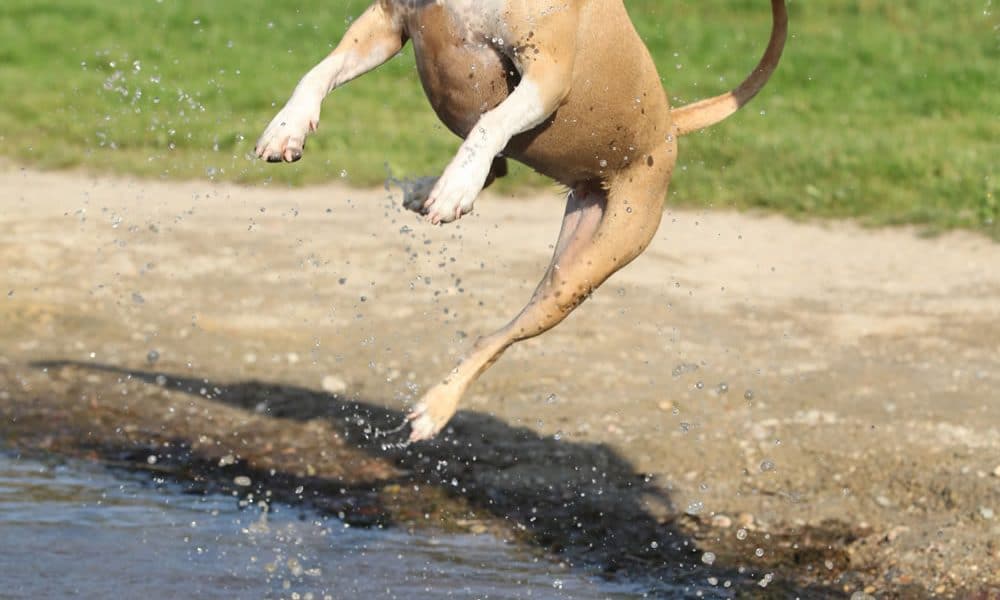Why Do Dogs Urinate When Excited?
No matter how cute and fluffy a puppy may be, no one enjoys urination when greeted at the door. Dogs that urinate when excited or scared cause frustration, inconvenience and a lot of clean up. Excessive urination is often one of the top reasons dog owners surrender their pets to shelters. Fortunately, it is not a hopeless situation if owners focus on the reasons behind the urination and implement steps to prevent it.
 Most excitement urination occurs in puppies. Like young children who are potty-training, puppies do not yet have strong muscles for bladder control. It takes focus for them to hold it, and any distraction or excitement can make them forget. Most accidents happen during playtime, or when family members or guests arrive at the home.
Most excitement urination occurs in puppies. Like young children who are potty-training, puppies do not yet have strong muscles for bladder control. It takes focus for them to hold it, and any distraction or excitement can make them forget. Most accidents happen during playtime, or when family members or guests arrive at the home.
Excitement urination also happens with older dogs who are easily excitable or lack self-confidence. Dogs often look to their human companions as a source of happiness, so when their human comes home, it causes almost overwhelming excitement. The heart races, the tail wags, the drool flows, and the bladder goes! The greeting experience causes physical reactions that the dog cannot control.
The easiest way to combat excitement urination is to minimize the level of excitement the dog experiences. When arriving at home, the owner should ignore the dog for the first few minutes after coming in the door. Then once the dog has calmed down, the owner can quietly give greetings in a normal, calm voice, not high-pitched. After a few more minutes of calm behavior, the dog can be petted. The calm approach allows pooches to maintain more steady emotions rather than getting so worked up that they lose control.
Guests should follow the same procedure when they visit. Friendly dogs want to greet guests and be acknowledged, but visitors should not pet or greet right away. After a few minutes in the home, they can pet the dog and speak calmly in a normal tone.
To prevent accidents, owners should allow dogs to empty their bladder outside right after waking, before playtime, and immediately after the owner gets home. Dogs should be walked prior to any guests’ arrival so the bladder is empty when the excitement happens.
Excitement urination can also be caused by insecurity. The more confidence dogs have, the less likely they are to lose control when excited. Daily training with basic commands allows dogs to experience positive reinforcement from their human, creating confidence that carries over into other aspects of behavior.
Sometimes urination issues stem from submission. Bending over a dog or petting its head are dominant behaviors that cue a submissive animal to cower, roll over, or urinate. In addition to the calm environment and confidence-building described above, owners of submissive dogs should avoid domination triggers. Kneeling or squatting to greet the dog can help, as well as keeping eye contact to a minimum.
The most important thing to remember when dealing with excitement or submission urination is that it is an involuntary physical reaction. It is not something the dog is doing on purpose! Any signs of anger or displeasure from the owner will only reinforce the negative behavior. What the dog wants most is to please the human. Yelling or punishment for urination will only cause confusion and fear in a cycle of trying to please, sensing displeasure, and trying harder to please.
Luckily, most puppies grow out of excitement urination by the age of two. Dogs of any age can be helped, though. Taking steps to minimize excitement and increase confidence can ensure that dogs and their owners have a happy, dry relationship.


